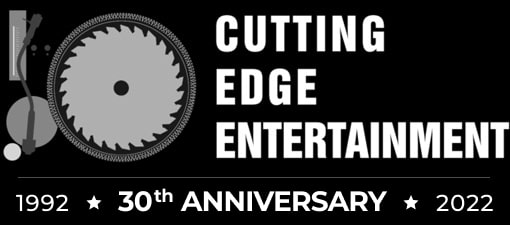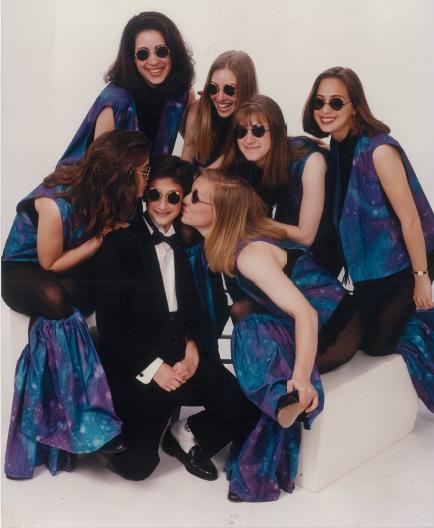Growing Up At Cutting Edge Entertainment
My name is Andrew, and I used to be a Cutting Edge DJ.
Reading Seth’s recent post regarding his life as a Cutting Edge DJ brought back some nostalgia, and also reminded me that I’d told Craig that I would write a similar kind of post. So before you people steal all of my ideas, here goes…
I’m sure that all of us can list experiences that we can’t imagine our lives without. For me, life at Cutting Edge Entertainment goes at the top of that list.
Many years ago, Craig gave me a job opportunity, the value of which I have come to appreciate more and more over time. It was an opportunity to grow up with a company. It was an opportunity to learn a skill. Indeed, it was an opportunity to learn about life, from a perspective few people see, and fewer can appreciate.
It was 1993, and I was a very small thirteen-year-old. Cutting Edge was small too, with just five DJs at the time (Craig, Joe, Lou, Rob and Boris) besides me, and around the same number of dancers (see the picture I know Craig will attach—yes those are Adidas socks I’m wearing). Josh Kohn and my best friend Jake Dreyfuss soon followed. I still have my first Cutting Edge shirt: a black long-sleeve t-shirt, with the phone number for Craig’s old house (the Cutting Edge office soon followed).
My first DJ job was Temple Beth Torah’s annual party, which became something of an annual tradition for Cutting Edge, though I hear the place no longer exists. All of Cutting Edge was there, yet it took us over two hours to set up, and another two hours to break down after the party. That’s because each light was in its own little cardboard box, with weird wallpaper on the outside. I wasn’t much help either, being that most of the equipment seemed impossibly heavy to me. I came home from that night with a cool $25.00 cash. And no, that wasn’t a lot of money in those days either.
But the money never really had much to do with it. What I liked was that I was learning how to do something truly cool from people who clearly knew what they were doing.
Even so, I didn’t pick things up right away. It wasn’t for lack of effort or desire. I wanted desperately to be a good DJ. At my first DJ practice, the song I learned to cue music with was “New Age Girl” by “Deadeye Dick.” As soon as I learned what mixing was (my second job, at William Tennant High School), I wanted to do that too, but it took me a long time–years–to really get it down.
The feedback at Cutting Edge, for better or worse, was honest. When I did something right, I heard about it, and when I did something wrong, I really heard about it. At the time, I didn’t like this very much, since most of what I was hearing was that I was making mistakes, which of course I was.
Eventually, though, there were far fewer mistakes. By the time I left Cutting Edge, my skills were fundamentally solid. And through college, through after-college, even through law school, I had something that I could do better than almost anybody else.
I came to appreciate how good my training had been when I saw some of the alternative. It was only once I left Cutting Edge that I saw just how little quality control there was—and is—in the DJ business.
Walk into many clubs or bars in DC—places where you’d expect to hear people who’ve mastered the craft—and you’ll instead find awful mixing, horrific song choices, and DJs who should be kept at least 50′ from the nearest microphone. Weddings and Bar/Bat Mitzvahs, forget about it. Some of what I’ve seen is too painful to repeat.
What do bad DJs have in common? They think they’re good DJs. Why? Because when they were “learning,” there was no one to tell them when they sucked and to show them the right way to do things.
I’ve found that there are certain things that a Disc Jockey who “gets it” really gets.
– A DJ who gets it knows that there’s no such thing as a “throwaway song.” He knows that the party rests on whatever song he plays next, and takes every possible opportunity to make the perfect choice.
– A DJ who gets it knows music, not just the songs he personally likes, but the songs that the party needs at a given time.
– A DJ who gets it knows how to mix. He knows what a bad mix sounds like, and pays attention to how his own mixes sound.
– A DJ who gets it pays attention to volumes and knows how to control them.
– A DJ who gets it can read a room, and knows his place in that room.
– A DJ who gets it knows that mixing, scratching, sampling, talking on a mic, and so forth, are just means to an end, that end being energy. He knows that ultimately, what a DJ does is create, harness, and manage the energy in a room.
Above all, a DJ who gets it takes what he does seriously.
I said that DJing is learning about life and I absolutely meant it. Learning to read a room, learning your place in it, learning to relate to people—these are essential life skills. And knowing that you can walk into a room where everyone might well be different from you, and win those people over with the strength of your skills, is something few jobs can teach.
These are things I learned at Cutting Edge. And I’ve seen their value time and again since I left the company back in 1999. In college, what started out as a novelty—DJing clubs and bars in DC—became a much more serious pursuit, as my friend Will Fulmer (and later Jake Dreyfuss, again) and I began DJing all over DC, often for three or four nights every week.
One of those nights was at a club called Platinum. My cousin Annie brought her best friend Stephanie, whom I met for the first time that night, and whom I married seven years later.
Another of those nights was supposed to be September 11, 2001, at a club called Daedalus, which was being opened by two UVA Law School grads, named Dave and Kijun. That obviously didn’t happen, but I ended up DJing at Daedalus for nearly every week before I went to law school. This included a weekly “Asian Night” (see above re walking into a room where everyone is different from you). And when I was applying to UVA Law, Dave and Kijun wrote my recommendations.
My “retirement” party before heading off to UVA was the opening of Dave and Kijun’s super-cool new bar, K Street Lounge. But I didn’t end up in retirement for long. It turned out that both the law school and the town of Charlottesville, VA, was seriously hurting for good DJs, and I quickly found myself very busy once again.
My “second retirement” party, before leaving law school for big-firm-lawyer life, was at a “Latin Night” at a place called X-Lounge, in Charlottesville, where I had a regular gig (see above, again, re walking into a room where everyone is different from you). And when a car accident shortly after this destroyed my speakers, I figured this retirement would probably last.
But I couldn’t let go of DJing completely. When Dave and Kijun decided to open a new bar in Georgetown, appropriately called “George,” I came out of retirement once again to DJ its grand opening. I DJ’d there a few more times, but had to stop when my day job became too hectic.
Still, today, I haven’t stopped DJing completely. And I’m starting to wonder if I ever will. Now it’s mainly just friends’ weddings, and occasional club nights. Real life makes DJing difficult these days. But real life and DJing are impossible for me to separate completely. Because nearly everything that I’m doing in real life today—my marriage, my job, much of my social life—can be traced to my DJ work in one way or another. How differently it all might have turned out, had I not had the chance to grow up with Cutting Edge Entertainment.
Andrew George
Attorney at Law… and DJ
Photo credit: Hy Paul Studio L.L.C. circa 1994


How about “A DJ who gets it knows when to play a solid 70’s funk set, so we could wear those crazy tie-dye outfits”.
I still remember your bar mitzvah Andrew George!
-Bekah